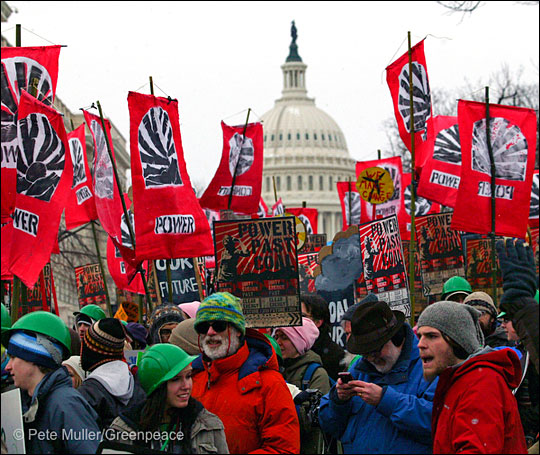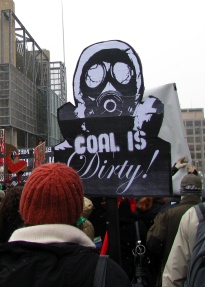
No one was arrested, but not for lack of trying.
An estimated 2,500 people protested outside Washington, D.C.’s Capitol Power Plant on Monday — the nation’s largest act of civil disobedience against coal power.
Anti-coal activists from all corners of the country braved the sub-freezing temperatures and six inches of snow the city received Sunday night. The uncharacteristically wintery conditions egged on global-warming skeptics, but the crowds marching around the plant weren’t deterred by the bad weather.

Nor were they deterred by last week’s good news that congressional leaders are planning to convert the Capitol Power Plant to natural gas by the end of the year — a move that seemed designed to preempt the protest.
They came bearing signs: “Topless mountains are obscene.” “Clean coal is like dry water.” “Renewable is doable.” They had chants: “Clean coal’s a giant lie. We won’t let our planet die.” “Coal companies stop your whining. We don’t want your dirty mining.” “Why are we standing out in the snow? ‘Cause dirty coal has got to go.”
Many protesters planned to get arrested, but even after several hours of occupying the plant’s northeast corner gate, they got no reaction from hundreds of police officers stationed nearby. Organizers declared the protest a success without arrests at around 4:30 p.m., as the sun started to set and temperatures began dropping even lower.
“I think any time you have 2,500 people willing to take action and risk going to jail to stop a coal plant, it’s a good thing,” Michael Brune of the Rainforest Action Network told Grist as the protest wrapped up. “And I think what’s quite clear is that we have more momentum than ever to start shutting down coal plants around the country.”
Morale was also boosted by the dismal showing for the “Celebrate Coal!” counter-protest organized by the Competitive Enterprise Institute. Total turnout for the pro-coal rally was less than 20, including CEI interns carrying standard-issue signs with slogans like “Our economy runs on coal.” A duo of Irish filmmakers working on a documentary about “global warming hysteria” were also out, holding signs that declared Al Gore “not evil, just wrong.” (See photos from the protests.)

Monday’s action against the power plant was coordinated by the Rainforest Action Network, Chesapeake Climate Action Network, and Greenpeace. Attendance also benefited from the more than 12,000 student activists in town for the Power Shift conference, some of whom turned out for the power-plant demonstration.
Climate movement luminaries were on hand, including climate scientist James Hansen, veteran activist Robert F. Kennedy Jr., actress Daryl Hannah, writer Wendell Berry, former Salt Lake City mayor Rocky Anderson, and 350.org founder and Grist board member Bill McKibben (who also blogged about Monday’s action). Hansen, McKibben, and Anderson were at the front of the action, signaling their intention to get arrested.
But it’s the rank-and-file protesters who gave the strongest sense of how the anti-coal movement is growing. Among them was Rory McIlmoil, campaign coordinator for Coal River Wind, which is fighting to get wind power going in his home state of West Virginia rather than letting more mountains be destroyed by coal mining. He was arrested on Feb. 3 at an action against coal company Massey Energy, which plans to blow up Coal River Mountain, and he has since been served a restraining order to keep him off all Massey property.
“There’s a lot of solidarity. It’s amazing to see the whole country come together,” said McIlmoil. “We need to stop them all. We need to stop all the coal that’s being pulled out of Appalachia and poisoning our water.”
Louise Benally also came to the rally from her own fight against coal back home, in the Black Mesa area of northern Arizona. Members of the Navajo nation there have been fighting coal mining for 35 years, concerned about both property rights and the health impacts of mining on native communities.
“We don’t need to kill Mother Earth for corporate greed,” said Benally. “Coal — keep it in the ground. We need to survive.”
Other activists included Beth Henry of Charlotte, N.C., who is organizing against the Cliffside Power Plant being constructed in Rutherford County, N.C. Likewise, John Blair of Evansville, Ind., who lives in the midst of the largest concentration of coal-fired power plants in the world, has been organizing with the group Valley Watch for 30 years. Abedin Jamal, an Afghani student studying linguistics at Southern Illinois University, was rallying despite an exam scheduled for the next day.
Protester Gretchen Goldman, a Ph.D. student at Georgia Tech studying environmental engineering, said, “I wanted to be able to tell my kids that I did something about it. If there’s no polar bears in the world, I want to say that I did something to try to stop it, I wasn’t just apathetic about the whole thing.”
Organizers hope protesters will take the momentum from Monday’s action back to their hometowns and local battles.
“We’re almost down one [coal-fired power plant]. We’ve got 634 to go,” said Brune of the Rainforest Action Network. “Even though the event today didn’t culminate in actual arrests, I think what we’re going to see is waves of direct action across the country against coal plants and the expansion of fossil-fuel infrastructure.”

